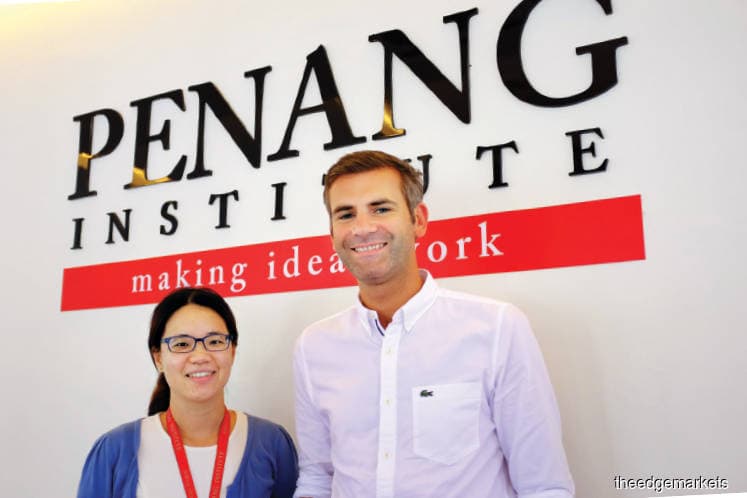
This article first appeared in The Edge Malaysia Weekly on October 2, 2017 - October 8, 2017
PENANG’s manufacturing sector hired 329,400 people last year, making it the second biggest employer after the services sector, the Department of Statistics Malaysia’s data shows.
Since 2010, the manufacturing sector has registered marginal dips and rises in the number of workers, in step with global demand in the electrical and electronics and semiconductor sectors.
As Industry 4.0 beckons and the world embraces the Internet of Things, Penang’s SME sector is seen as slow to transform, with some companies stuck in their “business as usual” mode.
While the resistance to change is just one of the problems, SMEs lack funding and skilled labour to boost productivity through automation.
Invest-in-Penang Bhd general manager Datuk Loo Lee Lian says many companies are already adopting Industry 4.0 concepts of smart factory, data analytics and automation. Electronic manufacturing services players that used to focus on high-volume, low-end production are now involved in systems-build equipment and are investing in research and development.
“But their biggest constraint is the lack of technical talent to run the machines. I think this is also a nationwide problem,” says Loo.
“It used to be a shortage of engineers [only], but now with Industry 4.0, we need technicians for software and hardware integration. This gap needs to be filled.
“There are also problems of automation cost and the adoption of new technology by technicians and the middle-class management.”
To address the labour problem, Penang has spearheaded and is part-sponsoring the Malaysian Meister Programme, formerly known as the German dual-vocational programme (GDVT), to upskill workers.
The state government has allocated RM6 million to subsidise 20% of the students’ fees, with the remainder applicable under the Human Resources Development Fund.
“It targets factory operators who are keen on upskilling themselves. The state pays part of the fees and they take days off to attend professional training,” Loo says.
The 24-month courses on precision machining and mechatronics are conducted at the state-run Penang Skills Development Centre.
The state has also implemented programmes for school students centred on Science, Technology, Engineering and Mathematics such as the Penang Tech Dome, Penang Science Café and Accelerator Programme.
“We are serious about this. We want companies that come here to be R&D and technical-based. Through the Meister programme, we want to ensure a sustainable workforce with a science and technology background,” Loo says.
“One investor said he chose Penang because it has an ecosystem for developing talent in the interest of science and technology, and wants to be a tech state.”
She says Penang wants to move towards smart, advanced manufacturing as there is a continuous flow of investment into the sector. Among the investments are Aemulus Holdings Bhd’s RM25 million for the Leap-O-Pad programme to support new start-ups in the next three years and Broadcom Ltd’s relocation of its global distribution hub to Penang.
“Yes, the companies are still in manufacturing, but they are going into higher-end products. We also tell new investors that they have to engage with local companies on R&D activities. We are trying to attract integrated circuit design houses to Penang,” Loo says.
State think tank Penang Institute chief communications officer and economist Tim Niklas Schoepp says there should be SME-friendly policies and a stable environment to keep good people, besides offering good salaries, incentives, a pleasant work environment and a clear career path.
Bank Negara Malaysia’s requirement for 75% of export proceeds to be converted to ringgit and the levy on foreign workers are examples of policies that hurt SMEs.
“This is where we identify the problems for SMEs. If investments are not poured into digitalisation, SME development will be hindered,” Schoepp says.
These concerns are compounded by external uncertainties and a weak ringgit.
Therefore, having a ready pool of skilled talent is crucial, says Schoepp.
“The ones (MNCs) that offer better packages and work environment will get the better people. That is where local companies need to change, but not many are doing it,” he says, adding that firms should start accepting that vocational training is equivalent to a university degree.
“Industrialised countries have better vocational training opportunities, including MNCs offering in-house programmes,” says Schoepp.
“However, people must acknowledge vocational training in order to close the skill-set gap in Penang, which is a manufacturing hub. If you want to increase the value chain, then the industry has to do this.”
Schoepp, who brought the GDVT programme to Penang two years ago (later adopted by Selangor and Johor), says successful trainees earn a German and Malaysian certificate under the programme.
Penang Institute social studies progamme head Ong Wooi Leng says there is a mismatch between university programmes and job requirements, meaning that candidates need to be retrained.
“Many firms complain that they have engineers but not quality ones. So, for Industry 4.0, it is a matter of whether the education system can keep pace with the advancement of technology,” she says.
“If our talent pool is not ready to take the industry to the next level, then we may have a problem.
“What we can do is to make an effort to reskill workers at the lower level and upskill those in the middle to upper levels.
“This is where production improvement and ideas come ... when working on a product or working at a machine. It does not come only from the classroom. There must also be on-the-job training.”
Save by subscribing to us for your print and/or digital copy.
P/S: The Edge is also available on Apple's AppStore and Androids' Google Play.